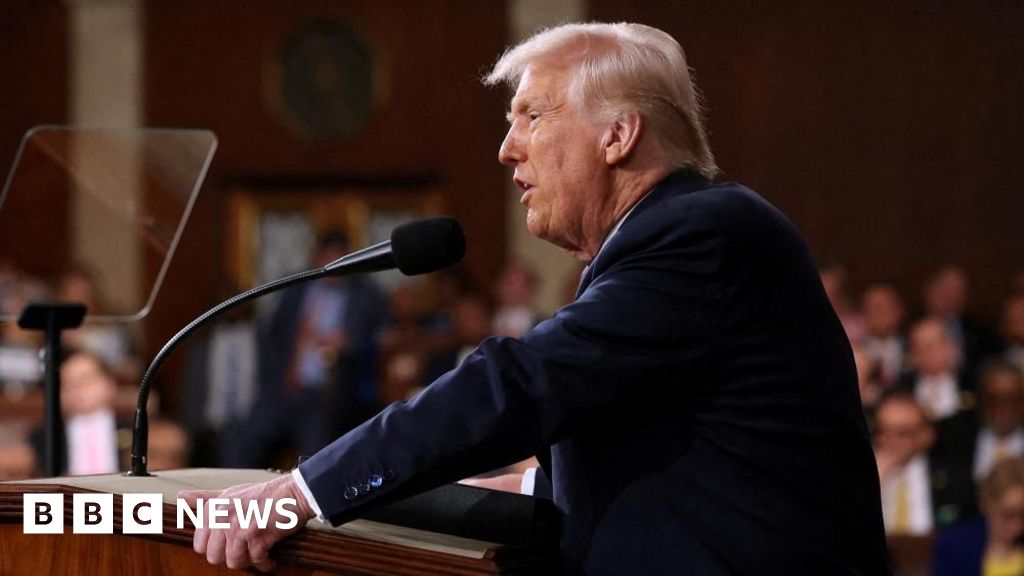Trumps week of dealing means a fast pace with few concerns about risks
- BBC News
On Wednesday, in a series of high-stakes diplomatic episodes around the globe, Trumps free-wheeling attitude toward foreign policy was on full display, playing out in real time through posts on his Truth Social account.
For his supporters, it was the presidents "art of the deal" in action, using every negotiating tool and tactic at his disposal.
For critics, it was another day of disruption for its own sake – with little apparent concern for the risks involved or the potential consequences.
Wednesday began with news that the US is directly negotiating with Hamas leaders for the release of American hostages still in Gaza. Contacting a group designated a foreign terrorist organisation by the US since 1997 represents a dramatic shift away from decades of US policy.
The Biden administration relied on intermediaries during its attempts to end the Gaza war. And Trump previously condemned Hamas for committing "atrocities against humanity" during its 7 October 2023 attack on Israel, calling its members "vicious and violent".
But for Trump, it seems, the old playbook wasnt working – and he was willing to risk appearing hypocritical, of bypassing US ally Israel, and of sitting down with a designated terror group to advance his deal-making goals.
Israel Prime Minister Benjamin Netanyahus office responded with a terse statement, saying only that it had "expressed its position" on the talks.
By the end of the day, after meeting in the Oval Office with some previously released American hostages, Trump again turned up the heat on the group. He took to Truth Social to call it "sick and twisted" and issue a "last warning" that if members didnt release all the hostages there would be "hell to pay".
"I am sending Israel everything it needs to finish the job," he wrote, "not a single Hamas member will be safe if you dont do as I say."
Laura Blumenfeld, a former senior Israeli-Palestinian policy adviser to the US state department, told the BBC that Trumps message to Hamas was an ultimatum.
"The deal, though, with these ultimatums is you have to deliver," she said, "and we saw last month when Trump said youve got a high noon deadline on Saturday, release the hostages, or else, there was no or else.
"And Hamas called them out. They said, President Trump, your threats have no meaning."
Press secretary Karoline Leavitt had earlier placed the presidents dramatic changes of course into the context of Trumps larger foreign policy, telling reporters that "dialogue and talking to people around the world" is a part of his "good faith effort to do whats right for the American people".
The White House has employed similar logic to Trumps recent efforts to thaw US relations with Moscow, including dispatching high-level administration officials to Saudi Arabia to meet directly with a Russian delegation.
That dramatic diplomatic about-face accompanied sharp criticism of Ukraine and its President, Volodymyr Zelensky, which culminated in Fridays heated meeting in the Oval Office. An announcement followed this week saying that the US had suspended arms shipments, and another on Wednesday said intelligence-sharing with the war-torn nation was paused.
Trumps actions left Americas European allies rattled – and the consequences of that may not yet be fully appreciated. But his efforts to exploit Ukraines pressure point – withholding aid and information - appear to have produced the intended result.
Zelensky on Tuesday sent a conciliatory letter to Trump proposing a limited ceasefire, and US and Ukrainian officials resumed talks on Wednesday about a mineral deal to compensate America for aid expenditures.
If Trumps goal is to encourage Ukraine and Russia to enter peace talks, he has effectively brought Zelensky to heel, even as it remains unclear what concessions he is asking Russian President Vladimir Putin to make during those negotiations.
Sometimes, even with Trump, the pressure points go in the other direction.
A month ago, he announced sweeping new tariffs on Canada and Mexico, only to back away from them at the last moment. This week he allowed those 25% levies to go into effect – at least for a day.
After two days of sharp declines in the US stock market, the White House appeared to dial back the severity of these tariffs somewhat, announcing that it was granting a one-month exemption for automobiles imported from Canada and Mexico.
US car manufacturers warned that the new tariffs could devastate the industry, leading to plant closings within a matter of weeks.
Trump spoke with Canadian Prime Minister Justin Trudeau on Wednesday, and offered his own readout – via Truth Social – on what he said was a "somewhat friendly" call, even as he accused the "governor" of Canada of using the trade issue to "stay in power".
While Zelensky quickly backed down under White House pressure and the Hamas talks are only beginning, Trudeau and the Canadians, for their part, appear to be settling in for a longer fight.
Trumps convention-breaking playbook may be shaking things up this week, but its far from clear if they will deliver the kind of wins he wants.
Follow the twists and turns of Trumps second presidential term with North America correspondent Anthony Zurchers weekly US Politics Unspun newsletter. Readers in the UK can sign up here. Those outside the UK can sign up here.